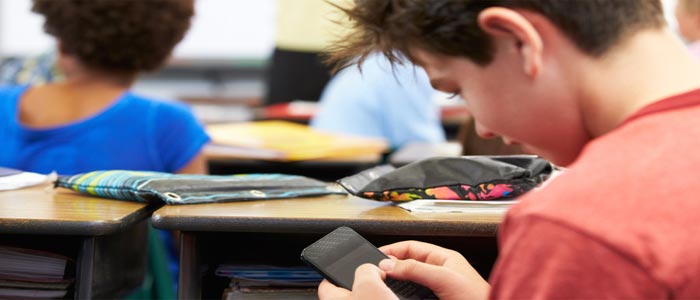Deciding to Record: Not a Snap Judgement
Feb 12, 2018
Recently, it seems our news feeds have been inundated with stories of teachers being recorded by their students making controversial comments and later facing disciplinary action or backlash from their district administration. Within the past month, a video of a high school teacher in Southern California bashing the military as the “lowest of the low” went viral; the teacher’s comments led to the school launching an investigation.
The issue of recording teachers and other school personnel reached Niles West after an incident between a student and a security guard was recorded in a school bathroom and posted to a Snapchat story. In the recording, the security guard, who no longer works for the district, can be heard lecturing the student about the dangers of the world after he suspected the student of having an illicit substance.
The rise in these incidents begs for an examination of district policy concerning recording on school grounds. According to the district 219 student behavior guidelines, “Using a cellular telephone, video recording device, personal digital assistant (PDA), or other electronic device in any manner that disrupts the educational environment or violates the rights of others, including using the device to take photographs in locker rooms or bathrooms, cheat, or otherwise violate student conduct rules” is prohibited.
So, for West students, it is still prohibited to record peers and staff members on school grounds without facing school consequences, including detention and possible in-school suspension.
Illinois law is slightly more lenient when it comes to public conversations. Former governor Pat Quinn signed a law in 2014, the Illinois Eavesdropping Act, “that allows citizens to record public conversations without obtaining consent from all parties involved.” However “conversations in which someone has a ‘reasonable expectation’ of privacy still require all-party consent and cannot be ‘surreptitiously’ recorded” under the law.
The distinction between personal and private conversations is essential to understanding the debate about video recording in schools. In the eyes of most students, recording can be acceptable, and even necessary, in certain situations.
“I feel like recording varies depending on the situation,” senior Riley Pranian said. “I think the bathrooms are a private space, but obviously sometimes there is something wrong going on. Specifically with administration, I feel like it is against the law to record teachers, but sometimes I feel like it’s necessary to, for lack of a better word, expose behavior.”
Some students think video recording, especially of teachers or other people in positions of influence, is the most effective way of garnering evidence that a person is doing something wrong.
“Though I don’t know whether it’s legal or illegal, I do think it’s a little bit odd that you’re occasionally not able to record people if they are clearly in violation of some sort of law or code, such as screaming at you or such,” senior Sean Collins said. “Otherwise, there is very little proof whether that happened if it was in an enclosed space, you should be able to record that so you can get that proof.”
There are teachers who see the positive aspects of video taping for an educational purpose, but recognize that many people would consider it a violation of their personal privacy to be recorded or photographed by another person.
“I think that video taping, as long as it has the sights set on learning, is really effective because then it allows for authentic dialogue between the student and the teacher for them to reflect on the learning environment,” chemistry teacher Michael Nocella said. “We really need to check the intentions of the video-taping and the context. In any instance, we just need to be upfront with each other and transparent if we’re going to engage in video-taping because there are a lot of privacy barriers that need to be honored and respected in those moments. But we also don’t want to come at it with a deficit perspective; we want to come at it as an opportunity, not something that’s infiltrating the learning environment.”
Although there may be potential positive benefits of recording a situation surreptitiously, some people are against it on the grounds that it violates people’s privacy without their knowledge or consent.
“I think it is not right to record someone without their permission, and so you can’t take that evidence into account because it’s wrong to have gotten it in that way,” senior Jaser Siddiqui said.
Despite the many students who think video recording a situation at school is okay, the fact remains that it is against school policy. Unless that policy is changed, students face the threat of disciplinary action every time they choose to record their teachers or classmates without permission.





Peter • Feb 12, 2018 at 11:53 AM
It seems like the district is being hypocritical if they can record students (on security cameras throughout the building) but students can’t record each other or teachers/staff.
Bongo • Feb 12, 2018 at 11:52 AM
What is a PDA?